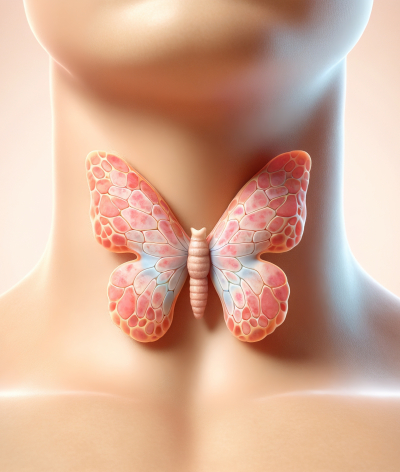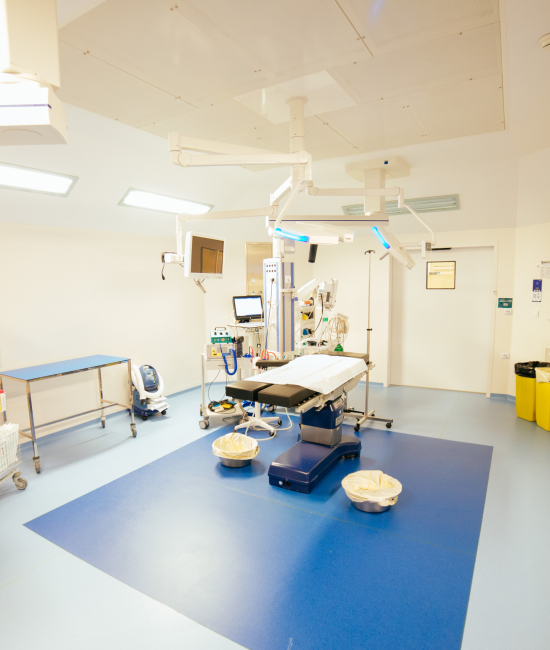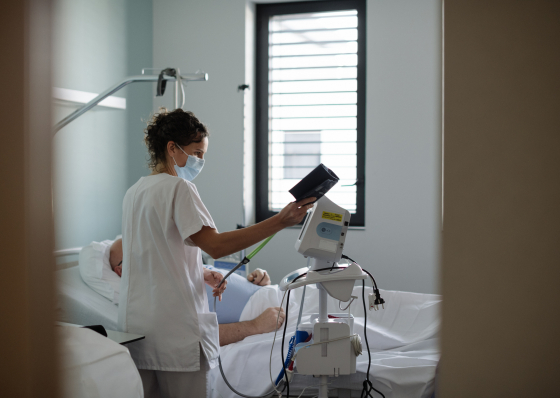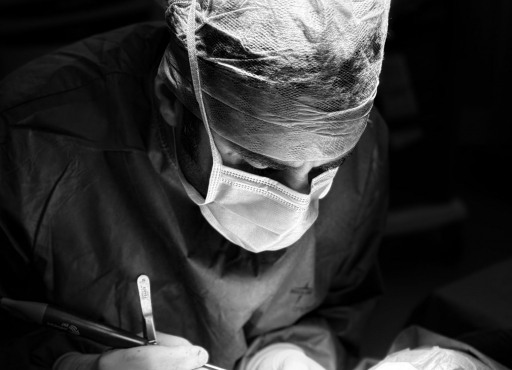Thyroid Surgery
The thyroid is a butterfly-shaped gland located at the base of the neck in front of the trachea. It plays a fundamental role in regulating the body’s metabolism by producing two main hormones: T3 (triiodothyronine) and T4 (thyroxine), which influence heart rate, body temperature, energy expenditure, mood, and growth.

Conditions
Thyroid Conditions
Thyroid Nodules: Common and usually benign; they may require monitoring or further evaluation by fine-needle aspiration if they appear suspicious.
Goiter: Enlargement of the thyroid gland, which may cause cosmetic concerns or compression symptoms affecting swallowing or breathing.
Hyperthyroidism: Excess production of thyroid hormones causing nervousness, weight loss, palpitations, insomnia, etc.
Hypothyroidism: Insufficient hormone production leading to fatigue, weight gain, cold intolerance, constipation, and general slowing of bodily functions.
Thyroid Cancer: souvent découvert après analyse d’un nodule opéré. La plupart des formes sont de bon pronostic lorsqu’elles sont prises en charge précocement.

You are going to have thyroid surgery
Your Surgical Journey at Thyropole Center
Before Surgery
In most cases, you’ll have first consulted with an endocrinologist who confirmed the need for surgery based on symptoms, lab tests, and imaging (ultrasound, scintigraphy, fine-needle aspiration, etc.). A surgical consultation is then scheduled with a Thyropole surgeon. During this meeting, the procedure is explained in detail, surgical options are discussed, and all your questions are addressed. A post-operative appointment will also be scheduled. Finally, you’ll see an anesthesiologist at Clinique Belharra to prepare for surgery.
Hospitalization at Clinique Belharra
You will be admitted on the day of surgery.
In the operating room:
Surgery is performed under general anesthesia and lasts on average between 1 and 2½ hours, depending on the procedure (lobectomy, total thyroidectomy, lymph node dissection, etc.).
Upon heading to recovery, your comfort is ensured, your voice is checked, and a PTH test is conducted to detect any post-op drop in calcium levels.
Return to your room:
Once fully awake, you are monitored for pain, neck status, voice, and lab parameters. Calcium levels are checked the day after and the second day after surgery. Hormone replacement therapy starts the following day if needed. In most cases, discharge is possible 24 to 72 hours after surgery.
Une fois la consultation de contrôle effectuée, plusieurs consignes et étapes de suivi vous seront proposées pour accompagner au mieux votre récupération à moyen terme.
Soins de cicatrice
À ce stade, la plaie est en principe bien refermée. Le médecin vous prescrira une pommade cicatrisante, à appliquer chaque jour pendant plusieurs semaines, afin d’améliorer l’aspect de la cicatrice et prévenir les adhérences ou les épaississements cutanés.
Il est également formellement recommandé d’éviter toute exposition solaire directe sur la cicatrice pendant au moins un an, même en hiver. Une protection par écran total (SPF 50+) est indispensable en cas d’exposition accidentelle. Le port d’un foulard ou d’un col haut est également conseillé lors des sorties prolongées.
Rééducation orthophonique
En fonction de l’évaluation orthophonique initiale ou de vos ressentis, une rééducation orthophonique pourra être poursuivie ou mise en place, notamment en cas de gêne vocale, de fatigue à la parole ou de trouble de la déglutition.
Kiné de massage de cicatrice :
Une prise en charge complémentaire par un kinésithérapeute formé au massage des cicatrices vous est proposée. Elle permet d’assouplir la zone opérée, d’améliorer le drainage local et de favoriser une cicatrisation esthétique optimale.
Suivi endocrinologique à 5–6 semaines
Une consultation avec votre endocrinologue est généralement prévue entre 5 et 6 semaines après l’opération. Ce rendez-vous a pour but :
- de contrôler votre bilan biologique, notamment le calcium sanguin et la TSH (hormone stimulant la thyroïde),
- d’évaluer la nécessité ou l’adaptation d’un traitement substitutif (Lévothyrox, calcium, vitamine D),
- et d’organiser la suite du suivi hormonal si besoin.

Post-Thyroid Surgery Follow-Up
Post-Op Consultation (10–15 Days After Surgery)
Post-Op Consultation (10–15 Days After Surgery)
This visit is a crucial check-in that usually unfolds in two parts:
Medical Consultation: You’ll be seen by a Thyropole doctor right after a speech therapy visit. During this, they’ll review your bloodwork (especially calcium), examine the scar’s appearance and function, and give guidance on scar care (ointments, massage, sun protection, etc.). You’ll also receive and discuss the histopathology report to confirm diagnosis and guide further care. If cancer was detected, your case will be reviewed in a multidisciplinary tumor board (RCP) to plan the optimal follow-up.
After the Post-Op Consultation (Around Day 15)
Scar Care
You’ll continue using a healing ointment daily for several weeks. Avoid direct sun on the scar for at least a year (SPF 50+ recommended) and consider using a scarf or turtleneck during extended outings.
Speech Therapy
If voice fatigue, speech difficulty, or swallowing issues persist, speech therapy may be recommended.
Scar Massage
A trained physiotherapist may provide scar massage to soften the area, aid local drainage, and promote aesthetic healing.
Endocrine Follow-Up (5–6 Weeks Post-Op)
A consultation with your endocrinologist is generally scheduled to check calcium and TSH levels, adjust replacement therapy (Levothyrox, calcium, vitamin D), and organize ongoing hormonal follow-up.
Book an appointment with us
Do you have a suspicious thyroid nodule, thyroid cancer, or a hypercalcemia work-up suggesting hyperparathyroidism? Contact us today for a prompt evaluation and high-quality surgical care.
